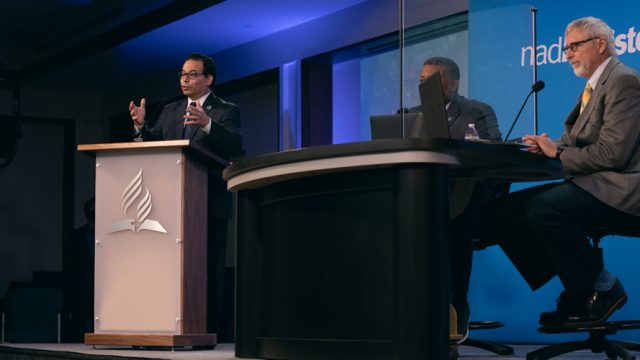Or a time to engage?

If this recent crisis surrounding the COVID-19 pandemic has reminded us of anything, it’s that humanity is basically self-centered. Revealed in cell-phone videos gone viral are images of people reduced to fighting over cases of bottled water and toilet paper (toilet paper?).
And now with the pandemic reaching global proportions, some religious people have had a hard time resisting the impulse to compare the novel coronavirus with the plagues described in the Bible. Couldn’t this be one of the signs of the end?
The Bible surely describes plagues poured out on the earth prior to Jesus’ return, but does COVID-19 qualify as one of them?
Remember, the great issues involved in the final conflict are those of faith, loyalty, and obedience. As far as I know, no one has suggested that this is anything but an unfortunately deadly virus that affects persons of most every age, religious affiliation, and geographical location.
That hasn’t prevented people from using a tortured logic to identify COVID-19 with the number 666 and post their conclusions on social media. This just reinforces the negative image of those who take events making headlines and turn them into vehicles for highlighting their own misguided theological views designed to induce fear and insincere repentance.
Since the first century, Christians have looked forward to Jesus’ return, and rightly so. In the last 2,000 years, Christians have watched world events that directly affected them and wondered whether Jesus would soon return. In recent times, those events have included natural disasters, world wars, religious persecution, financial collapses, and others.
To be sure, Jesus promised, “There will be great earthquakes, famines and pestilences in various places, and fearful events and great signs from heaven” (Luke 21:11).
But He also said, “This gospel of the kingdom will be preached in the whole world as a testimony to all nations, and then the end will come” (Matt. 24:14).That’s why, rather than trying to force Scripture to validate our particular interpretation of prophecy, we should be preaching the gospel and demonstrating Christian values of service, sacrifice, and unselfishness.
When the virus was confined to Asia, most people in the Americas and Europe barely gave it a thought. When it arrived in Italy and threatened to jump the pond and appear in the United States, our self-centeredness kicked in. Self-preservation is a powerful motivator.
But, thankfully, it’s not the only human characteristic recently on display. Dedicated medical workers—doctors, nurses, orderlies, respiratory therapists, paramedics—all demonstrate a level of self-sacrifice rarely seen except in times of crisis.
We can add to that list people who serve the public in ways less prominent than medical professionals. I’m thinking of supermarket employees (cashiers and shelf-stockers), police officers, firefighters, janitors, utility workers, food bank volunteers. Without their faithfulness, society would surely descend into chaos.
This is no time to hoard bottled water, toilet paper, or anything else. Our friends, families, and neighbors should know us for our dedication to Christ, our unselfishness, and our willingness to share everything—except COVID-19.
Stephen Chavez is an assistant editor for Adventist Review.








